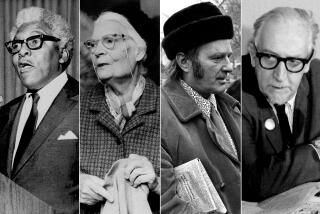Senior citizens bring experiences of a lifetime to Great Decisions, international-style.
- Share via
Charles M. Larson, his lap filled with “A Field Guide to the U.S. Economy” and World Press Review magazine, was ready for the first question of the night: “Do you think that if Gorbachev’s economic reforms are carried out, the Soviet Union would be more or less dangerous to the U.S.?”
“I’m not too optimistic because the people of the United States are paranoid,” said Larson, 76. “I’ve never been afraid of the Soviet Union. What can they do to us that they haven’t already done to themselves?”
Some people Larson’s age busy themselves with nothing more controversial than a friendly game of dominoes. But he spends his days poring over newspapers and political magazines, preparing for the weekly meetings of Great Decisions, a national foreign policy discussion group affiliated with the United Nations.
Larson, whose self-proclaimed specialty is economics, says if it were not for Great Decisions, he would have a hard time finding anyone interested enough or knowledgeable enough to discuss international politics.
Great Decisions groups meet weekly for two months each spring, taking on topics from Mexico to the Middle East, from the Soviet Union to South Korea. The groups gather in the afternoons and evenings mostly in church meeting halls around Whittier, and range in size from three to as many as 40.
The topic of a recent meeting was Russian leader Mikhail Gorbachev’s political reforms, but Larson and Clayton Church, 74, ended up straying into a discussion of how the United States rationalized the atomic bombing of Japan to end World War II.
Larson, with studious eyes and a salt-and-pepper beard, criticized the U.S. government’s position that dropping the devastating bombs actually saved lives because it abruptly ended a war that could have dragged on for years.
“I’ve never heard of a more obvious lie,” Larson declared.
“Well, I’ve never heard of a more obvious truth,” countered Church, who leaned forward in his folding chair as he emphasized how determined the Japanese were to keep fighting.
Discussing foreign policy issues takes on another dimension with the involvement of senior citizens, many of whom vividly recall when the Soviet Union was an ally of the United States instead of an “evil empire,” as President Ronald Reagan once called the U.S.S.R.
Discussion leader Judy Prather opened a recent group session on Gorbachev’s Soviet Union by asking participants to name a country that had been a consistent ally of the United States.
Jeanne Bergstrom, 69, responded by saying it was hard for her to take any political alliances seriously because they change so often. “It’s hard for people my age to switch all these feelings,” said Bergstrom, a former Whittier College professor who also has been a group leader.
Bergstrom said she remembers living in Minnesota during World War II when the Soviets enjoyed favorable propaganda. “We were told, ‘Everybody can go to the opera in Russia, no matter what income level you were,’ ” she said. “This was very appealing to me, because I wasn’t of the privileged class.”
In the 1920s and 1930s there was a greater diversity in the way U.S. citizens viewed the Soviet Union, said Prather’s husband, George. “The Cold War wiped this out,” he said. “Our view of the Soviet Union has narrowed since the bomb developed.”
As an example, Prather stated that today’s politicians equate citizenship with nationalism. He said even the most liberal politician, when voting whether to send money to the Nicaraguan Contras, feels obligated to declare, “I am not a communist, but . . . “
The evening’s discussion moved on to speculation about whether the Soviet Union would ever join the European Common Market and about how Gorbachev should manage ethnic rioting now going on in some Soviet provinces.
And through it all, the dozen or so participants argued their positions with conviction, greeting some opinions with knowing nods and others with distrustful scowls, as if they were State Department analysts preparing to advise the President.
Maurice Meysenberg, a Rio Hondo College sociology professor, has been coordinating Great Decisions in the Whittier area for three years. Group registration is conducted by Rio Hondo, and is free to anyone who wishes to participate. An optional $8 book, which outlines the issues to be discussed, is published by the Foreign Policy Assn., a nonprofit and nonpartisan organization sponsored by an affiliate of the United Nations.
Most people who attend the meetings are “extremely well-informed,” Meysenberg said, adding that in the last few years the discussions tended to have a liberal bias.
“This year, I’ve got a core of conservatives who are making the liberals do their homework,” Meysenberg said. “If you’re going to take a position, you have to take care in (not) inventing facts because chances are somebody there will know.”
Whittier--whose Great Decisions chapters draw about 90 people every week, most of whom are senior citizens--is the only Southeast city where the meetings are offered, group organizers said.
“Whittier, as a community, has an image of being fairly conservative,” said Judy Prather, a longtime Democratic activist and president of the local League of Women Voters. “But for its conservatism, the organization and activism in this community is quite phenomenal.”
Prather believes there is a link between the activism and the fact that many Whittier people are longtime residents. “They feel more of an investment in the community,” she said. “I attribute that to the Quaker heritage, which promotes the sense of investment in one’s life.”
More to Read
Sign up for Essential California
The most important California stories and recommendations in your inbox every morning.
You may occasionally receive promotional content from the Los Angeles Times.










